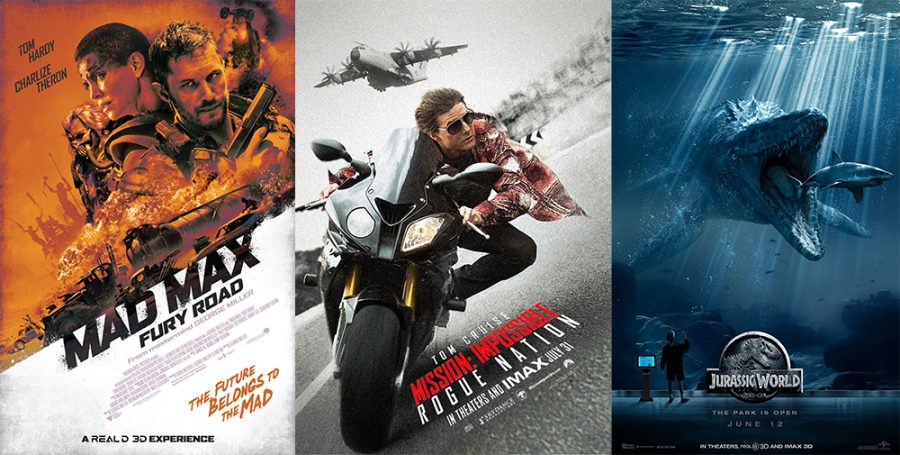Blockbuster report
A collision between summer fun and social commentary.
September 7, 2015
Blockbuster season comes every summer and with it comes an expectation: to enjoy whatever Hollywood has to offer this year and turn off your brain. Every year, critics ignore this advice, writing reviews and think-pieces that examine these summer flicks, attempting to diagnose where they go wrong and what they fail to do.
BLATANT OFFENDERS
These articles often involve criticisms of the amount of superhero movies and computer-generated effects, but this year, the most popular subject by far was sexism. Given the outrage culture we live in, some films will always be unjustly vilified, but it should not come as a surprise that in a season of movies that indulge in the baser elements of storytelling, women are rarely written well. There have been worse, more blatant offenders in past years but there was still plenty to talk about this summer.
HIGH HEEL CONTROVERSY
High heels factored prominently into the conversation about two of the releases. “Jurassic World” received more criticism than any other film, perhaps boosted by the movie’s outstanding box office performance. The fact that its female lead never thinks to take off her high heels when running from giant death monsters reflected how little thought was put into writing her character.
Later in the summer “Mission: Impossible – Rogue Nation” accidently responded to the criticisms of “Jurassic World” by featuring not one, but two scenes where Rebecca Ferguson takes off her shoes before the action starts. If this seems overly simplistic, it is. But the high heels symbolized all the ways “Mission Impossible” succeeded with its lead female character, just as they illustrated the failings of “Jurassic World.”
A FEMINIST MESSAGE
There might not have been much discussion on either movie, however, had it not been for the masterpiece that preceded both. On a technical level, “Mad Max: Fury Road” is unlike anything action cinema sees anymore, brought to life by George Miller, the man who radically influenced the genre more than 30 years ago.
“Fury Road” would be an incredible achievement based on its filmmaking alone, but its message made it even more unique among the rest of the summer fare. It does not just avoid being another sexist blockbuster; it directly comments on sexism in blockbusters — the titular Max becomes a supporting character in his own movie, and the story focuses on a group of women fighting for their freedom in a post-apocalyptic world. Focusing on these women elevates the film to the masterpiece that it is.
Full of subtle character work, “Fury Road” depicts a world where the most basic gestures — a thumbs up or a nod — are meaningful interactions. The post-apocalypse effectively represents the worlds created by the worst blockbusters, where all humanity has been stripped away and only base desires remain. Repeatedly, the female characters state, “We are not things,” which is exactly what women are reduced to in most blockbusters. The story in “Fury Road” is about fighting to regain that humanity. They wonder out loud, “who killed the world,” and strive to bring it back to life.
By supporting its feminist message with genuine character work and tangible humanity, “Fury Road” directed the entire focus of the conversation this summer and made a strong case for never turning off your brain when at the movies, no matter what time of year.







